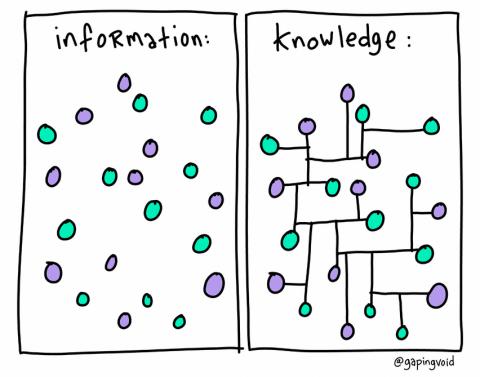
Information is everything, but when the information is transformed into Knowledge, is even better.
There are two types of knowledge assets. The first is Explicit Knowledge, which is information that the organizations hold and this can include reports of different projects, research, different types of databases. As a good rule this information can be stored either electronically or on paper. The second and much more elusive asset is the Tacit knowledge, which are skills and experience that is in the heads of employees, which is often the most valuable asset that an organization holds. The major difficulty with unlocking this value is to work out an effective methodology to recognize, generate, share and manage that knowledge.
The intellectual capital of the organization depends to a large extent on all the persons who are part of it, but it also depends on its operational and organizational structures and on internal and external relations.
In other words:
Tacit Knowledge: Knowledge, in the minds of organization members, not formulated in words or in a visual manner, not defined and not passed on to others.
Explicit Knowledge Knowledge recorded in documents, in databases and in procedures, formulated in words or in a visual manner, and can be found and included in the organization.
Benefits of Knowledge Management
• Increase performance
• Improves corporate image
• Opens new markets
• Enhances your company brand and gains a reputation as a reliable business
• Attracts the best employees through our enhanced reputation.
• Improves the quality of your offers
• Optimizes processes and results
Knowledge management is responsible for understanding:
● What the organization knows.
● Where this Knowledge is located, e.g. in the mind of a specific expert, a specific department, in old files, with a specific team, etc.
● In what form this knowledge is stored e.g. the minds of experts, on paper, etc.
In an ideal company, All individuals in the organization are expected to respect the knowledge of other people - especially of local offices. Furthermore, staff members are expected to share their knowledge, particularly that of a tacit and implicit nature, in appropriate format. They are also encouraged to convert their knowledge into an explicit form that can be readily shared with others.
If you have any questions regarding how to implement a Knowledge Management culture in your company and other Knowledge Management Techniques, please send me an email trough the contact form.
